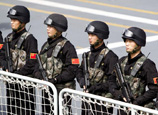
Polio, or poliomyelitis, is a virus that infects the brain and spinal cord, mostly in children younger than 5 years old. One in every 200 cases leads to paralysis, usually of the legs.
"We've learned a lesson and will expand routine vaccinations in the area to avert future outbreaks," Wang said.
He said previous Chinese CDC studies showed that only 60 to 70 percent of Xinjiang residents had been vaccinated against polio, but 85 percent should be vaccinated to ward off an outbreak.
"In some areas the rate could be as low as 50 percent," he said.
In response, "the central government has allocated 160 million yuan ($25.7 million) to improve local public health services", Wang said.
Vaccination agencies will all be equipped with appliances to store vaccines at the necessary low temperatures, he said.
A suspected-case reporting system will be established at local hospitals to detect possible infections as soon as possible, he added.
In addition, border surveillance will be beefed up to prevent polio from entering China from abroad, he said.
According to Luo Huiming, deputy director of the National Immunization Program under the Chinese CDC, the outbreak last year was the first to come from abroad since 2000.
Because Xinjiang borders Pakistan and Afghanistan, where polio is endemic, "it's still at risk of infections, which know no boundaries", Luo said.
"We have to ensure comprehensive polio vaccination in the area to protect people from the disease," he said, adding that greater efforts should be made to raise vaccination awareness, particularly among ethnic groups.
















 Sex case leads to warnings about apps on smartphones
Sex case leads to warnings about apps on smartphones


![]()
